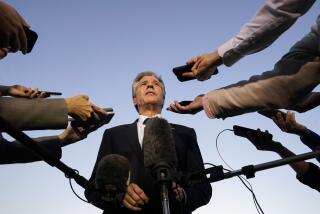Trying Not to Offend Anyone : Why Asian nations look to duck the hard issues of Gulf War
- Share via
With world attention riveted on the Persian Gulf, most of Asia has settled comfortably into the background under a veil of quiet ambivalence. That, and some low-key diplomacy, shroud fractious domestic objections to the region’s support of the war.
The first priority for Asian nations is regional stability for continued economic growth. Accordingly, they perceive the Gulf situation as a regional Mideast issue, not as a “new world order” issue. The main aim of many Asian nations--dependent on the Mideast for oil and jobs for their migrant workers--is to offend no one.
Westernized countries with close bilateral relationships with the United States--notably Japan and South Korea--are relatively big supporters of the allies. But in south and southeast Asia, home for about 180 million Muslims, from Pakistan to Indonesia, the escalating war is tapping a Muslim nationalism at the grass-roots level. Though their governments officially back the war, increasingly vocal citizens, particularly in Pakistan, are sympathetic with Saddam Hussein’s characterization of the Gulf War as a fight between Islam and the western powers. Still Asian countries, though mostly poor, are contributing in their own way:
Bangladesh was one of the first Islamic states to send troops to Saudi Arabia to defend holy places.
China, as a member of the U.N. Security Council, supported all U.N. Gulf resolutions but abstained on using force against Iraq.
India is allowing landing and refueling of U.S. Air Force transports of nonlethal cargo.
Indonesia, home for the world’s largest Muslim population, has a secular government that supports the war but has not sent in military or other aid. Kuwait was an important aid donor, Iraq a big trading partner.
Japan is Asia’s biggest war supporter with a planned contribution of $13 billion.
Malaysia, where Islam is the official religion, supported U.N. resolutions until it stepped down from the U.N. Security Council on Jan. 1. Now it has some reservations.
Pakistan has sent troops to Saudi Arabia to protect holy places. The government supports the war, but citizens have staged large protests against the presence of non-Muslim troops in the holy land.
The Philippines sent a 277-person medical team but last week the foreign secretary criticized the war in strong terms and fired up the U.S. ambassador there to denounce that attack as “inaccurate and offensive.”
Singapore sent a medical team of 30 people.
South Korea will contribute $500 million in financial and and material assistance and dispatched a 154-member medical team.
Taiwan, not a U.N. member, supports the war. It donated $30 million to Jordan.
Thailand sent 14 medical personnel.
Asia is trying to do its share.
More to Read
Sign up for Essential California
The most important California stories and recommendations in your inbox every morning.
You may occasionally receive promotional content from the Los Angeles Times.












